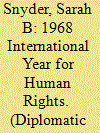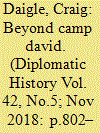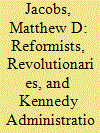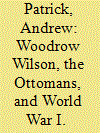| Srl | Item |
| 1 |
ID:
162828


|
|
|
| 2 |
ID:
162827


|
|
|
|
|
| Summary/Abstract |
This article explains the Carter administration’s retreat from supporting self-determination as a human right for Palestinians. It therefore moves beyond the focus by many scholars on the “heroic diplomacy” employed by Jimmy Carter, Anwar Sadat, and Menachem Begin leading up to and during the Camp David Summit, and instead examines Carter’s Arab-Israeli diplomacy in a broader international context that takes into account his larger policies towards the Palestinians and his emphasis on human rights in the conduct of American foreign relations. By looking beyond the Camp David agreement between Israel and Egypt – the agreement that led to the Egyptian-Israeli Peace treaty in 1979 and the return of the Sinai Peninsula to Egyptian sovereignty -- and focusing instead on Carter’s policy toward the Palestinians during his presidency, a more complex picture about Carter’s support for Palestinian self-determination begins to emerge that raises questions about his commitment to human rights abroad.
|
| Contents |
This article explains the Carter administration’s retreat from supporting self-determination as a human right for Palestinians. It therefore moves beyond the focus by many scholars on the “heroic diplomacy” employed by Jimmy Carter, Anwar Sadat, and Menachem Begin leading up to and during the Camp David Summit, and instead examines Carter’s Arab-Israeli diplomacy in a broader international context that takes into account his larger policies towards the Palestinians and his emphasis on human rights in the conduct of American foreign relations. By looking beyond the Camp David agreement between Israel and Egypt – the agreement that led to the Egyptian-Israeli Peace treaty in 1979 and the return of the Sinai Peninsula to Egyptian sovereignty -- and focusing instead on Carter’s policy toward the Palestinians during his presidency, a more complex picture about Carter’s support for Palestinian self-determination begins to emerge that raises questions about his commitment to human rights abroad.
|
|
|
|
|
|
|
|
|
|
|
|
|
|
|
|
| 3 |
ID:
162825


|
|
|
|
|
| Summary/Abstract |
In 1982, María Rosa Segura de Martini was the wife of a wealthy Argentine businessman, living in a fashionable neighborhood in Buenos Aires. In the aftermath of the Malvinas War, with the edifice of military dictatorship crumbling under the weight of economic stagnation and human rights protests, Martini and several friends pondered the looming democratic transition. How, they wondered, could Argentina build civic engagement, particularly among women, in a country where years of violent ideological conflict had destroyed political activity and erased a proud constitutional tradition?1
|
|
|
|
|
|
|
|
|
|
|
|
|
|
|
|
| 4 |
ID:
162831


|
|
|
| 5 |
ID:
162826


|
|
|
|
|
| Summary/Abstract |
The failure of a hardline coup attempt in the Soviet Union in August 1991 spelled the end of Communist Party (CPSU) rule in the USSR and left the Soviet state teetering on the brink of dissolution. In a September 1991 article in the Washington Post, David Ignatius attributed the coup’s defeat—as well as the crumbling of Soviet-style communist regimes across Eastern Europe in 1989—in part to a new weapon in the U.S. foreign policy arsenal: independent, overt democracy aid. “[T]he old era of covert action,” Ignatius proclaimed, “is dead.” Instead, over the past decade, a new “network” of private democracy organizations based in the United States had been “doing in public what the CIA used to do” covertly. By providing assistance to anti-communist groups in the Soviet bloc, he argued, these organizations had played a key role in nurturing the growth of democratic opposition movements across the Soviet empire.1
|
|
|
|
|
|
|
|
|
|
|
|
|
|
|
|
| 6 |
ID:
162829


|
|
|
|
|
| Summary/Abstract |
While discussing U.S. foreign policy in Latin America on the campaign trail in October 1960, Massachusetts Senator John F. Kennedy declared that “whatever we do in Cuba itself … we must create a Latin America where freedom can flourish—where long enduring people know … that they are moving toward a better life for themselves and their children—where tyranny, isolated and despised, eventually withers on the vine.”1 Kennedy’s rhetoric illustrated a deep understanding of the issues facing the United States in the Western Hemisphere. No challenge was greater than that of the Cuban Revolution.
|
|
|
|
|
|
|
|
|
|
|
|
|
|
|
|
| 7 |
ID:
162830


|
|
|